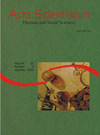<b>O conceito de resistência em três textos da literatura brasileira à luz da teoria pós-colonial</b> - DOI: 10.4025/actascihumansoc.v27i2.196
Resumen
Três textos da literatura brasileira que representam ficcionalmente a resistência do sujeito colonial são aqui objeto de análise. O Canto II de O Uraguai, a personagem Bertoleza de O cortiço e o conto “Pai contra mãe” são interpretados a partir da teoria pós-colonial de Bhabha, Ashcroft, Fanon, Spivak e outros para descobrir a modalidade de resistência ao colonizador por parte do sujeito colonial. Embora sejam encontrados traços de transformação nas atitudes das personagens, predomina a violência física como reação ao colonialismo. Segue-se uma discussão sobre a ambigüidade desse tipo de violência e sua possível substituição pela transformação ensejada na paródia e na ironia.Descargas
DECLARAÇÃO DE ORIGINALIDADE E DIREITOS AUTORAIS
Declaro que o presente artigo é original, não tendo sido submetido à publicação em qualquer outro periódico nacional ou internacional, quer seja em parte ou em sua totalidade.
Os direitos autorais pertencem exclusivamente aos autores. Os direitos de licenciamento utilizados pelo periódico é a licença Creative Commons Attribution 4.0 (CC BY 4.0): são permitidos o acompartilhamento (cópia e distribuição do material em qualqer meio ou formato) e adaptação (remix, transformação e criação de material a partir do conteúdo assim licenciado para quaisquer fins, inclusive comerciais.
Recomenda-se a leitura desse link para maiores informações sobre o tema: fornecimento de créditos e referências de forma correta, entre outros detalhes cruciais para uso adequado do material licenciado.


























